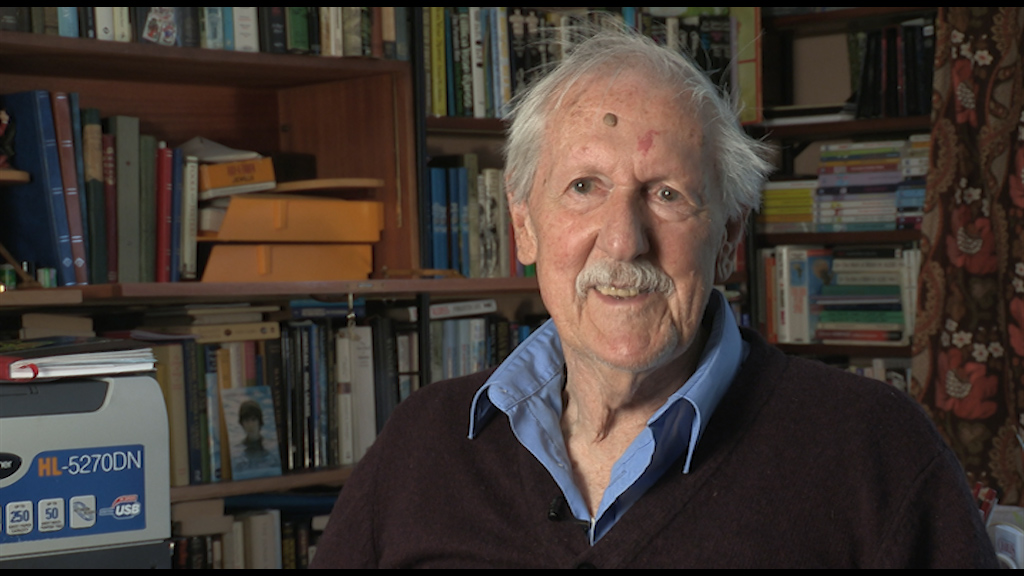NEXT STORY

Steven Spielberg steps into the breach
RELATED STORIES

NEXT STORY

Steven Spielberg steps into the breach
RELATED STORIES


|
Views | Duration | |
|---|---|---|---|
| 61. Hidden treasures of Serbia | 53 | 02:44 | |
| 62. Lord Byron’s legacy to Montenegro | 51 | 02:09 | |
| 63. Nocturnal yodelling on the island of Mljet | 29 | 02:15 | |
| 64. The Englishman’s aversion to science fiction | 53 | 04:12 | |
| 65. Without science fiction there’d be no Bovril | 70 | 03:25 | |
| 66. More on Billion Year Spree | 48 | 04:33 | |
| 67. Stanley Kubrick’s house | 313 | 03:46 | |
| 68. Working with a genius | 218 | 02:43 | |
| 69. Stanley Kubrick sets the bar high | 154 | 03:56 | |
| 70. Steven Spielberg steps into the breach | 116 | 02:58 |


Then... well, I knew three people that followed me on that film. First of all, there was a woman. I can't remember her name, she was a very nice woman. And, whether Kubrick wasn't good at what he was doing, I don't know. Anyhow, she would phone me and ask me for ideas, and I would do the best I could, but she also got the old heave-ho.
So, who did he employ then? Bob Shaw. Bob Shaw was a science fiction writer, and a merrier and wittier guy than Bob, you never had met. I knew Bob well. He was a friend of mine. Bob lived in Manchester and so, whereas I had a limousine come to collect me every day and to return me home, poor old Bob had to make his own way by train, which entailed two changes of train to get to Stanley's. And in no time, he was in trouble. And so he'd phone me in the evening and said, 'Brian, what can I do now? What ideas can I possibly give Stanley?' And I would say to him, 'I can only tell you what my ideas were. I've run out of any other ideas. I can tell you what mine were and you can put your own slant on them, and maybe that would work'. And so, I believe he did that; but of course, it didn't work and Kubrick kicked him out, too.
And so then... should I be telling you this? Stanley phoned his old partner who had worked on 2001, and that was Arthur C Clarke. And Arthur C Clarke then lived in what was known as Ceylon, and was still writing and associating with the great. And so, Stanley gave him the name of an English writer whom he knew. I knew this chap and I didn't like him much. At one time he'd lived in Oxford. Anyhow, he was the guy that eventually made it with Stanley.
And you see, if you see the film, there's a contradiction that Stanley would never have… never have borne. You know that if liquid goes down this chap's throat, he goes… he's out of the contest, he goes, urgh. But nevertheless, in the film, at one time he does, yes, he falls in the swimming pool, but he doesn't go, urgh. And so, that's a contradiction in terms. Anyhow, whatever the scene was there, I had no part of it, I can hardly discuss it.
Brian Aldiss (1925-2017) was an English writer and anthologies editor, best known for his science fiction novels and short stories. He was educated at Framlingham College, Suffolk, and West Buckland School, Devon, and served in the Royal Signals between 1943-1947. After leaving the army, Aldiss worked as a bookseller in Oxford, an experience which provided the setting for his first book, 'The Brightfount Diaries' (1955). His first science fiction novel, 'Non-Stop', was published in 1958 while he was working as literary editor of the 'Oxford Mail'. His many prize-winning science fiction titles include 'Hothouse' (1962), which won the Hugo Award, 'The Saliva Tree' (1966), which was awarded the Nebula, and 'Helliconia Spring' (1982), which won both the British Science Fiction Association Award and the John W Campbell Memorial Award. Several of his books have been adapted for the cinema. His story, 'Supertoys Last All Summer Long', was adapted and released as the film 'AI' in 2001. His book 'Jocasta' (2005), is a reworking of Sophocles' classic Theban plays, 'Oedipus Rex' and 'Antigone'.
Title: Stanley Kubrick sets the bar high
Listeners: Christopher Sykes
Christopher Sykes is an independent documentary producer who has made a number of films about science and scientists for BBC TV, Channel Four, and PBS.
Tags: Stanley Kubrick, Bob Shaw, Arthur C Clarke
Duration: 3 minutes, 56 seconds
Date story recorded: September 2014
Date story went live: 17 August 2015